"I want to tell you that your fact sheet on the [Missile Technology Control Regime] is very well done and useful for me when I have to speak on MTCR issues."
Iran Deal Scenarios and Regional Security
October 2021
By Farzan Sabet
The Iran nuclear deal is on life support. A major blow came in May 2018 when U.S. President Donald Trump withdrew from the agreement, formally known as the Joint Comprehensive Plan of Action (JCPOA), and launched a diplomatic, economic, and military “maximum pressure” campaign against Tehran. Despite expressing support for the agreement, President Joe Biden has delayed reentering it since taking office in January and instead retained the sanctions on Iran in a somewhat diminished form, thereby sustaining the deal’s precarious status.
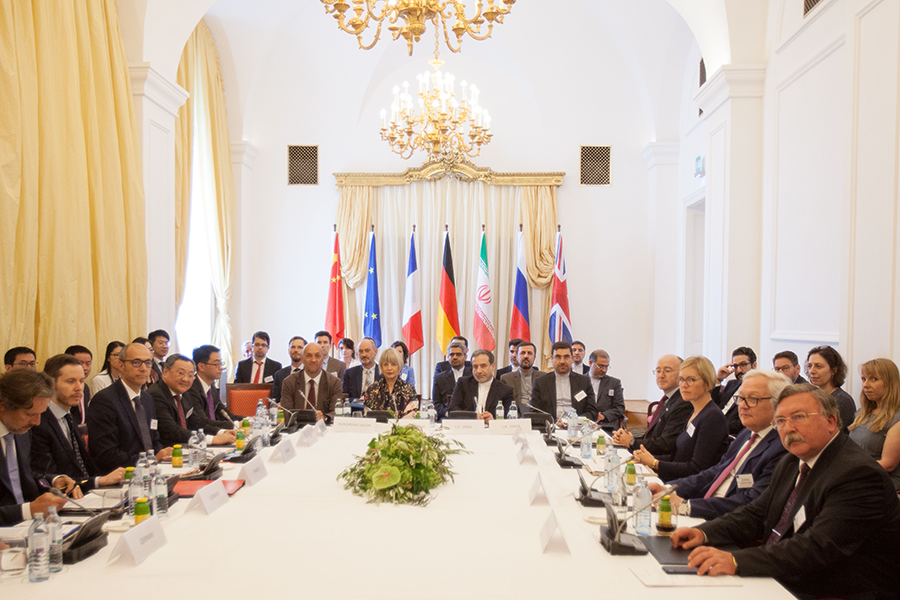 Iran initially exercised “strategic patience” regarding its nuclear activities after Trump’s withdrawal in the hopes that other participants in the nuclear deal—China, France, Germany, Russia, and the United Kingdom—could compensate for the economic loss wrought by the U.S. pressure campaign. When this support did not materialize as expected, Tehran shifted to “maximum resistance” in May 2019 by incrementally reducing compliance with the deal and increasing grey-zone military pressure on the United States and its allies in the Middle East.1 It is not known if Iranian policy will change under newly elected President Ebrahim Raisi. On one hand, Iran and the International Atomic Energy Agency (IAEA) recently concluded another temporary agreement to implement agreed verification measures and Iran’s foreign minister stated his country will return to nuclear negotiations “very soon.” On the other hand, Raisi has signaled that his government may take an even tougher approach.2
Iran initially exercised “strategic patience” regarding its nuclear activities after Trump’s withdrawal in the hopes that other participants in the nuclear deal—China, France, Germany, Russia, and the United Kingdom—could compensate for the economic loss wrought by the U.S. pressure campaign. When this support did not materialize as expected, Tehran shifted to “maximum resistance” in May 2019 by incrementally reducing compliance with the deal and increasing grey-zone military pressure on the United States and its allies in the Middle East.1 It is not known if Iranian policy will change under newly elected President Ebrahim Raisi. On one hand, Iran and the International Atomic Energy Agency (IAEA) recently concluded another temporary agreement to implement agreed verification measures and Iran’s foreign minister stated his country will return to nuclear negotiations “very soon.” On the other hand, Raisi has signaled that his government may take an even tougher approach.2
Although the other JCPOA participants have had limited success in reducing the effects of sanctions on Iran, they have played an important intermediary role by facilitating indirect negotiations between Washington and Tehran. Nonetheless, it is apparent that unless the United States is an active and full member of the deal, the other participants cannot continue to prop it up by themselves.
Yet, all is not lost. With political will, diplomatic skill, and some luck, the JCPOA could survive in some form and become an important component of future regional weapons of mass destruction (WMD) and security agreements. If the nuclear deal is not reinstated, the region will not benefit from the political and security breathing space that it could provide, but there will still be opportunities to address regional security, proliferation, and other challenges.
The Situation at Year Six
The Iranian government, despite benefiting from one of the world’s largest petroleum reserves, embarked on an ambitious nuclear energy program in 1974 that it claims is for peaceful uses.3 Since the outset, there have been accusations that Iran is secretly developing nuclear weapons, and this issue was pushed back onto the international stage in August 2002 when an Iranian opposition group revealed the existence of previously undeclared Iranian nuclear facilities.4 The JCPOA was intended to address the international community’s proliferation concerns by placing restrictions on Iran’s nuclear program in exchange for significant sanctions relief for Iran and cooperation with Iran’s peaceful nuclear activities.
The restrictions were designed so that, during the deal’s first decade, if Tehran wanted to cheat, it would take a year to break out and produce enough uranium-235 fuel for a nuclear weapon. In theory, that would be long enough for the IAEA to find out and the other JCPOA participants to take timely preventive action. The deal also dismantled Iran’s plutonium research and production capabilities, although Iran would eventually be permitted to reconstitute this infrastructure after 15 years if it so chose. It imposed very strong and intrusive monitoring, safeguards, and verification measures to ensure compliance. In addition, a key related UN Security Council resolution enshrined the JCPOA in international law, keeping in place an arms embargo on Iran for the first five years of the deal’s implementation, until 2020, and restricting ballistic missile development for eight years, until 2023. Furthermore, until 2025, the other JCPOA participants retain the option to snap back international sanctions on Iran in case of a significant violation.5
It remains to be seen if Iran and the United States will ever fully reimplement the deal. After taking office, the Biden administration, representing the participant that reneged on the agreement, had an opportunity to take the first step to return to the deal and encourage Iran to take reciprocal steps to resume its own commitments. Instead, the new U.S. government demanded that Tehran again fully comply with its commitments and raised new demands that go beyond those in the JCPOA. The Iranian government responded with its own set of demands.6
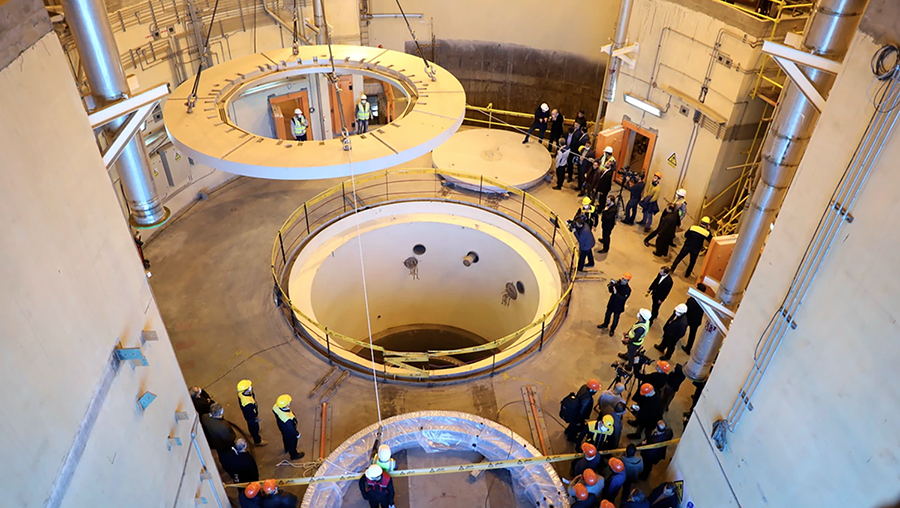 The demands by the two sides generally fall into three categories. The first is the type and level of concessions required by both sides before they are willing to fully reimplement the JCPOA. The United States has asserted that Iran has made unacceptable nuclear advances since 2019 and that compensatory nuclear restrictions are now required to get back to the one-year breakout time. A corollary issue is how to address Iran’s reduced compliance with enhanced IAEA monitoring, safeguards, and verification measures under the JCPOA and its refusal to answer questions about past nuclear work, although a recent agreement between the two sides to reset monitoring equipment may be a step in the right direction.7 In the past, Iran has demanded compensation for the economic damage done by the Trump-imposed maximum pressure campaign, which its foreign minister once claimed cost up to a trillion dollars.8 It also wants to keep some of the nuclear gains it has made.
The demands by the two sides generally fall into three categories. The first is the type and level of concessions required by both sides before they are willing to fully reimplement the JCPOA. The United States has asserted that Iran has made unacceptable nuclear advances since 2019 and that compensatory nuclear restrictions are now required to get back to the one-year breakout time. A corollary issue is how to address Iran’s reduced compliance with enhanced IAEA monitoring, safeguards, and verification measures under the JCPOA and its refusal to answer questions about past nuclear work, although a recent agreement between the two sides to reset monitoring equipment may be a step in the right direction.7 In the past, Iran has demanded compensation for the economic damage done by the Trump-imposed maximum pressure campaign, which its foreign minister once claimed cost up to a trillion dollars.8 It also wants to keep some of the nuclear gains it has made.
The second issue relates to what guarantees the two sides need to reenter the JCPOA. A key demand of the Biden administration has been that following U.S. reentry, Iran should agree to follow-up missile and regional security talks. Iran has demanded a commitment that the United States will not withdraw from the JCPOA in the future. It has also sought limits on the ability of the United States to trigger the snapback of sanctions.
The third issue centers on the sanctions on Iran. Tehran is seeking the removal of more than 1,500 Trump-era sanctions covering nuclear- and non-nuclear-related entities and activities and a process verifying their removal. The Biden administration is believed to have divided these sanctions into three baskets depending on their perceived inconsistency with the deal, including those to be lifted, those to be negotiated, and those that would remain.9
Three Future Scenarios
The current impasse suggests there are at least three possible scenarios for the JCPOA. Each would open different possibilities for how future Middle East security talks and agreements could unfold and represent a spectrum along which events could develop. There are many possible permutations; only a few are elaborated here.
Return to an agreement. In this first scenario, the two sides would simply return to the agreement as it existed before Trump’s withdrawal. With each passing month and as greater complexities emerge, this seems less likely. The expressed desire of both sides for a “better” deal indicates they may aim for a “JCPOA-plus” that incorporates some new compromises and trade-offs. Alternatively, they could take a page from the original JCPOA negotiations between Iran and the five major nuclear powers plus Germany by agreeing to a preliminary deal, such as the Joint Plan of Action concluded prior to the JCPOA, that meets some of the most urgent requirements. That could lessen tensions and create room for future talks and eventually, a JCPOA-plus deal that offers both sides more for more.
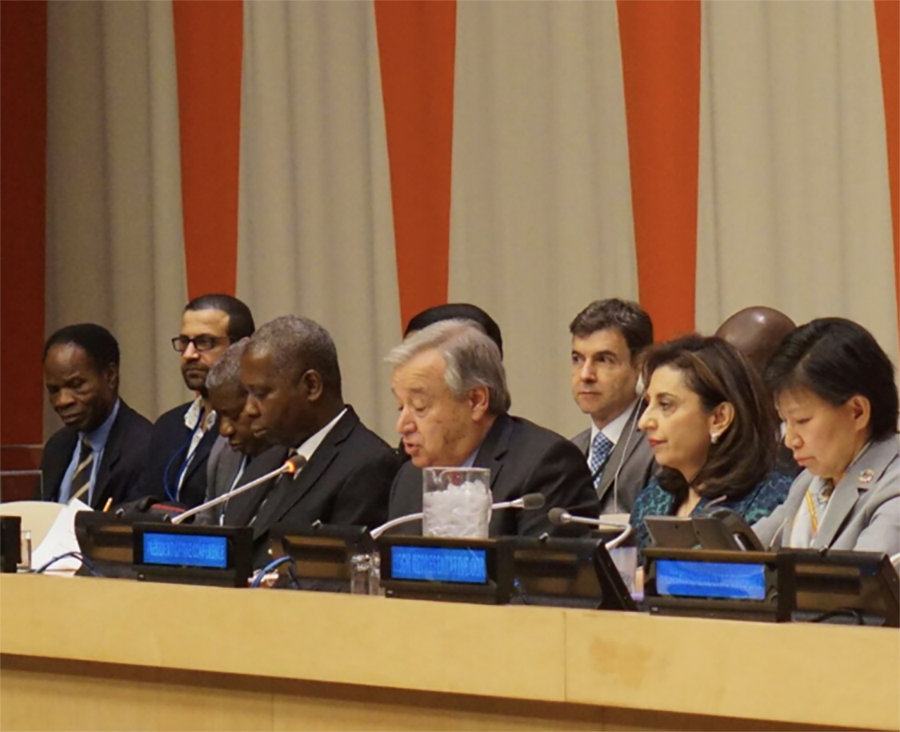 A JCPOA-plus could make a renewed agreement more durable in Washington and Tehran, at least for the remainder of Biden’s tenure, as both sides could claim they got a better deal. It also has the benefit of taking the nuclear issue off the table for now as a major source of U.S.-Iranian tension and could build confidence and space for talks on WMD and regional security issues. This scenario would not be as reassuring for the Arab monarchies in the Persian Gulf who are more concerned about Iran’s regional proxy network and ballistic missile program. Finally, it would give Raisi’s government an early political win and economic gains that enhance the new president’s legitimacy with the Iranian public and bolster his credentials abroad.
A JCPOA-plus could make a renewed agreement more durable in Washington and Tehran, at least for the remainder of Biden’s tenure, as both sides could claim they got a better deal. It also has the benefit of taking the nuclear issue off the table for now as a major source of U.S.-Iranian tension and could build confidence and space for talks on WMD and regional security issues. This scenario would not be as reassuring for the Arab monarchies in the Persian Gulf who are more concerned about Iran’s regional proxy network and ballistic missile program. Finally, it would give Raisi’s government an early political win and economic gains that enhance the new president’s legitimacy with the Iranian public and bolster his credentials abroad.
The road to a JCPOA-plus is strewn with perils. Such additional demands by the two sides would make reaching an agreement more difficult. Iranian principalists, labeled conservatives or hard-liners in the English-language press, who dominate the new government, have a tough negotiating style harkening back to the last time they were in power, in 2005–2013.10 If talks drag, the politics of the JCPOA could become more toxic for the Biden administration, which may be eager to avoid further criticism of its foreign policy ahead of the 2022 midterm elections after what many viewed as the botched U.S. withdrawal from Afghanistan.11
Status quo. In the second scenario, Iran and the United States would fail to restore full compliance with the JCPOA, but restrain their activities so the agreement does not fall apart entirely. The result would be a de facto “JCPOA-minus” that could limp along until the expiration of the snapback mechanism or the possible election of a new U.S. president, both in 2025, after which the Iran nuclear deal would be in renewed danger of complete dissolution.
No JCPOA. In the third scenario, one or both sides take steps to terminate the Iran nuclear deal, perhaps with the intention of gaining leverage for a JCPOA-plus or grand bargain that addresses issues beyond the nuclear file, although such outcomes would not be guaranteed.
Scenarios two and three carry greater risk of retaliatory economic, military, and nuclear escalations by the two sides and their respective allies. They also open the door to U.S. or Israeli military strikes on Iranian nuclear facilities. In contrast to its predecessor, the current Israeli government has signaled it would prefer a restored and fully implemented JCPOA to the status quo or no JCPOA. It also has indicated that, in the absence of such results or action by the international community, it is prepared to take military action.12
When Biden took office, a return to the original JCPOA appeared possible. Iran faced a grave economic situation, severely exacerbated by the COVID-19 pandemic, and sanctions relief would have given the country’s economy and health sector a shot in the arm. The Rouhani government and the so-called moderate coalition that backed it could have used a return to the JCPOA to improve their political fortunes in the 2021 Iranian presidential election. The Biden administration, in turn, could have distinguished itself from its predecessor in Iranian eyes, lowered tensions with Tehran, and further freed the United States to reduce its military presence in the region.13
Yet, both sides had reason to slow-walk JCPOA reimplementation. Biden and his team needed time to review and articulate a policy toward Iran and the deal. In addition, they made clear they would seek to redress certain perceived JCPOA shortcomings and reduce opposition to the agreement at home and abroad, but this approach effectively kept in place key elements of the Trump-era policy. Rouhani hinted that the sides were close to a deal but that a domestic law prevented it.14 As a result, scenario two, in which the de facto JCPOA-minus status quo continues for the foreseeable future, has become more likely.
This situation could continue to become more dangerous. The U.S.-Iranian nuclear dispute has not only heightened regional proliferation concerns, but spilled over into other domains. The U.S. maximum pressure campaign has raised doubts among Iranian elites about the utility of negotiating with Washington and will make achieving and sustaining future agreements more difficult. U.S. and Israeli overt and covert military actions against Iranian nuclear, missile, proxy, and other targets may have perceived security benefits for the perpetrators, but such actions also strengthen Iranian resolve to advance these programs and eventually retaliate.
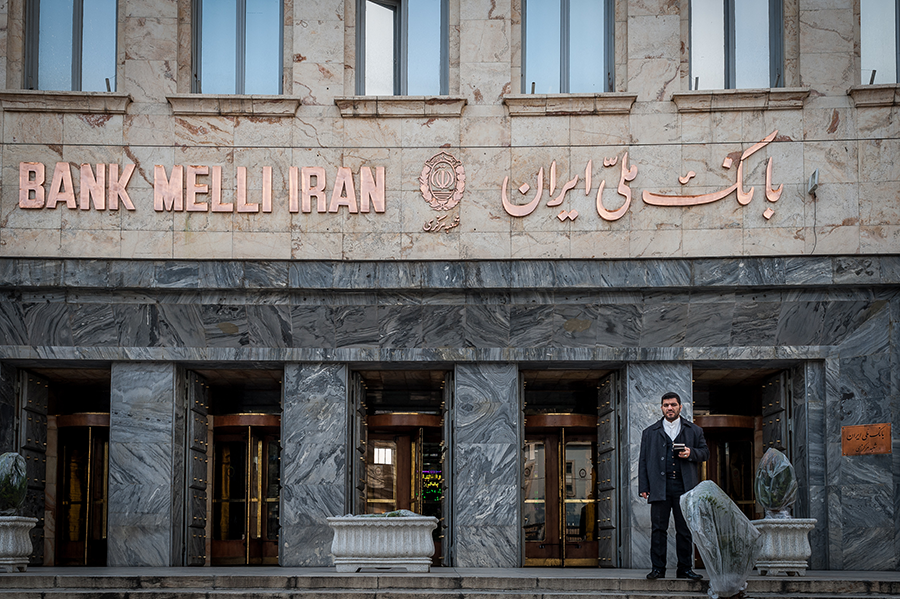 U.S. attempts to strangle the Iranian economy through sanctions have arguably been a key driver of Tehran’s reduced compliance with the JCPOA and worsened humanitarian conditions in Iran amid the global pandemic.15 On the other hand, any demonstration of Iranian capabilities in the nuclear, missile, and proxy domains risks military, economic, and political consequences while the country is coping with domestic unrest, economic stagnation, a worsening pandemic, water shortages, and a deteriorating environment. Finally, the conflict between the two has contributed to a deterioration of maritime security in regional waters. The United States and Iran are liable to remain in the status quo or sleepwalk into having no JCPOA at all due to overconfidence in their respective positions and the dubious belief that time is on their side.
U.S. attempts to strangle the Iranian economy through sanctions have arguably been a key driver of Tehran’s reduced compliance with the JCPOA and worsened humanitarian conditions in Iran amid the global pandemic.15 On the other hand, any demonstration of Iranian capabilities in the nuclear, missile, and proxy domains risks military, economic, and political consequences while the country is coping with domestic unrest, economic stagnation, a worsening pandemic, water shortages, and a deteriorating environment. Finally, the conflict between the two has contributed to a deterioration of maritime security in regional waters. The United States and Iran are liable to remain in the status quo or sleepwalk into having no JCPOA at all due to overconfidence in their respective positions and the dubious belief that time is on their side.
The JCPOA and Middle Eastern Security
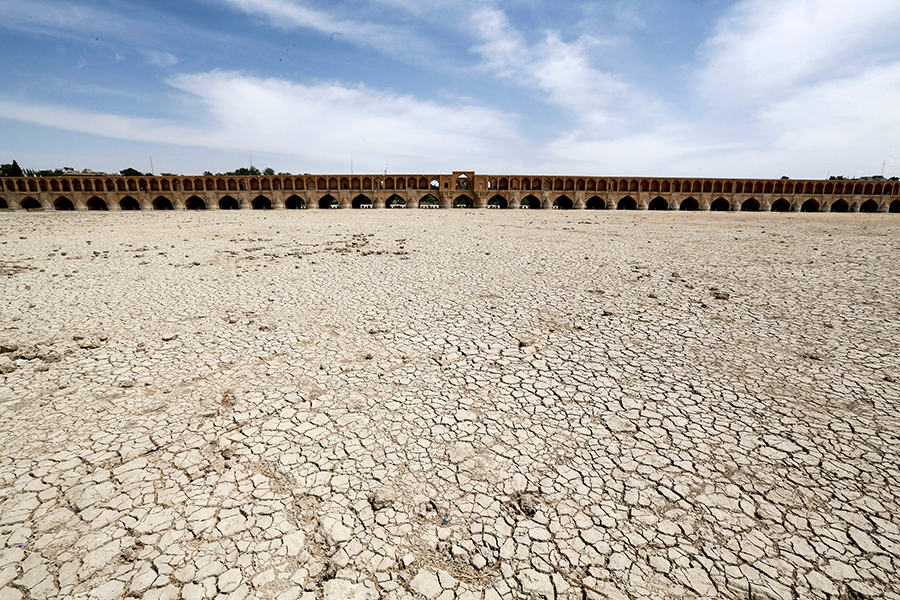 The Iran nuclear deal’s uncertain future looms as the U.S. withdrawal from Afghanistan and its reduced presence in Saudi Arabia, Kuwait, and Iraq underscore a shift of U.S. military and political interests from the Middle East to Asia. Although the region is likely to remain important for U.S. foreign policy, it is likely to be less of a focus as international relations move back toward great-power competition and global issues such as climate change and pandemics consume more attention and resources. Countries in the region are already looking inward and, by virtue of shared history and geography, to one another to address pressing issues.
The Iran nuclear deal’s uncertain future looms as the U.S. withdrawal from Afghanistan and its reduced presence in Saudi Arabia, Kuwait, and Iraq underscore a shift of U.S. military and political interests from the Middle East to Asia. Although the region is likely to remain important for U.S. foreign policy, it is likely to be less of a focus as international relations move back toward great-power competition and global issues such as climate change and pandemics consume more attention and resources. Countries in the region are already looking inward and, by virtue of shared history and geography, to one another to address pressing issues.
Since the 2011 Arab Spring, if not earlier, Middle Eastern countries and their nonstate associates have formed new coalitions as alliances with the United States and traditional groupings were perceived as less reliable or insufficient to meet present challenges. These new coalitions include the Iran-led “Axis of Resistance,” mainly composed of Shia and anti-U.S., anti-Israeli states and nonstate actors such as Syria, Hezbollah, Iraqi militias, and the Houthis; the anti-Axis alliance, composed of Israel, Saudi Arabia, and the United Arab Emirates; and the Turkey-Qatar partnership.16 There is also a principally nonstate Salafi-jihadi movement whose fortunes have ebbed and flowed since 9/11, but which may have gained a new center of gravity in Afghanistan, the Taliban’s claims to the contrary notwithstanding. These groupings have altered the old regional balance of power in the context of the U.S. pivot to Asia. These groupings and processes, such as the Abraham Accords, Iranian-Saudi talks,17 Turkish-UAE talks,18 the Saudi-Qatari reconciliation,19 and the Baghdad Conference,20 are in their infancy. Given the security challenges requiring cooperation among neighbors, their durability is uncertain.
Should the JCPOA be restored, as in scenario one, the momentum for Middle Eastern states to engage in negotiations and reach agreements on arms control and other security issues could increase. For example, regional states concerned about the deal’s sunset provisions on Iranian fuel-cycle capabilities could use the JCPOA’s reimplementation as a foundation on which to build. The Middle East is experiencing an increased interest in nuclear energy.21 Because parties to the nuclear Nonproliferation Treaty benefit from the right to the peaceful uses of nuclear technology, regional states could collectively decide to adopt their own measures to ensure the peaceful application of this technology. That could be one way to arrest the region’s long history of nuclear proliferation and counterproliferation conflicts.
There are many ways to do this. Given Iran’s negative experience with the JCPOA, the Raisi government may not be eager to quickly negotiate a follow-up agreement that extends nuclear restrictions or puts in place more stringent monitoring, safeguards, or verification measures. Even so, concerned regional states could cooperate with Iran to implement key elements of the JCPOA on a wider, more permanent basis by adopting bans on reprocessing, limits on uranium enrichment, and an additional protocol to their safeguards agreements. Persian Gulf states could also address nuclear issues on a more comprehensive basis as part of a subregional security dialogue. Several such proposals exist.22 Another possibility involves addressing nuclear issues as part of a Middle Eastern WMD-free zone. The Second Session of the Conference on the Establishment of a Middle East Zone Free of Nuclear Weapons and Other Weapons of Mass Destruction will take place November 29 to December 3 and could be a forum where regional states consider how to build on the JCPOA.23
Reimplementing the JCPOA could create momentum for bilateral, subregional, and regional dialogues on conventional arms control aimed at decreasing tensions between Iran and other regional states and allowing them to shift focus to other issues. Western and regional proposals for follow-on talks to the nuclear deal largely have focused on Iran’s ballistic missile program and militant proxy network so far. Talks that single Iran out and focus exclusively on its military capabilities will be a nonstarter for the Raisi government, which has promised a more assertive foreign policy.24 Regional states that advocate reductions or limits on Iranian capabilities must be willing to accept similar reductions or restrictions on their own capabilities. These states, which are building up their arsenals,25 feel vulnerable to perceived threats from Iranian capabilities and are unlikely to accept restraints now. Despite the limited prospects for this kind of conventional arms control, the various ongoing, ad hoc security dialogues and more ambitious proposals, such as one for a subregional security process, could still decrease tensions, facilitate confidence-building measures, and address conflicts such as those in Libya and Yemen.
Such arms control and security dialogues could take place under a JCPOA-minus, albeit with longer odds. Iran may still want to normalize its nuclear program with the international community and benefit from some U.S. sanctions relief and improved ties with neighbors. In turn, the United States and its allies may still be reassured somewhat by a JCPOA-minus, not want to fuel the deal’s further disintegration through maximum pressure-style tactics, and thus be open to talks on terms that are more palatable to Iran. Progress is more difficult to envisage with no JCPOA.
Cooperation on Nontraditional Security Issues
Under all three JCPOA scenarios outlined above, regional states should still discuss and act on nontraditional security issues that could be less sensitive right now but loom large for the future of the Middle East. For instance, most states have experienced major domestic unrest in the last decade driven primarily by the lack of economic opportunity for young people. The causes are legion, ranging from the structural to idiosyncratic. As in the rest of the world, the COVID-19 pandemic has delivered a major blow to Middle Eastern economies. The region is burdened by a legacy of exploitation, mismanagement, and corruption. Some states have been the persistent target of U.S. and international sanctions. The more affluent petroleum-exporting economies have experienced lower oil prices in recent years due to growing capacity, stagnant demand, and mounting global pressure to reduce the use of fossil fuels to combat climate change.26
The most attainable way to address the lack of opportunity is by improving economic relations among states in the region, which has long been underutilized due to a legacy of colonial boundaries, interstate conflict, and ethnosectarian divides. It would require negotiations to reduce barriers to stimulate cross-border trade, investment, and migration to drive growth. Regional states could work on joint projects from transportation to energy to education to meet critical needs while reinforcing the Middle East’s status as a nexus of global and Eurasian commerce. Although improving economic ties might raise fewer security sensitivities, there would still be obstacles, including patronage systems and protectionist forces. Furthermore, states may be reluctant to encourage economic ties in the absence of improved political relations. Even so, limited economic initiatives could eventually give way to long-term integration by increasing interdependence and people-to-people contact, thus strengthening common interests and personal bonds that mitigate future conflicts.
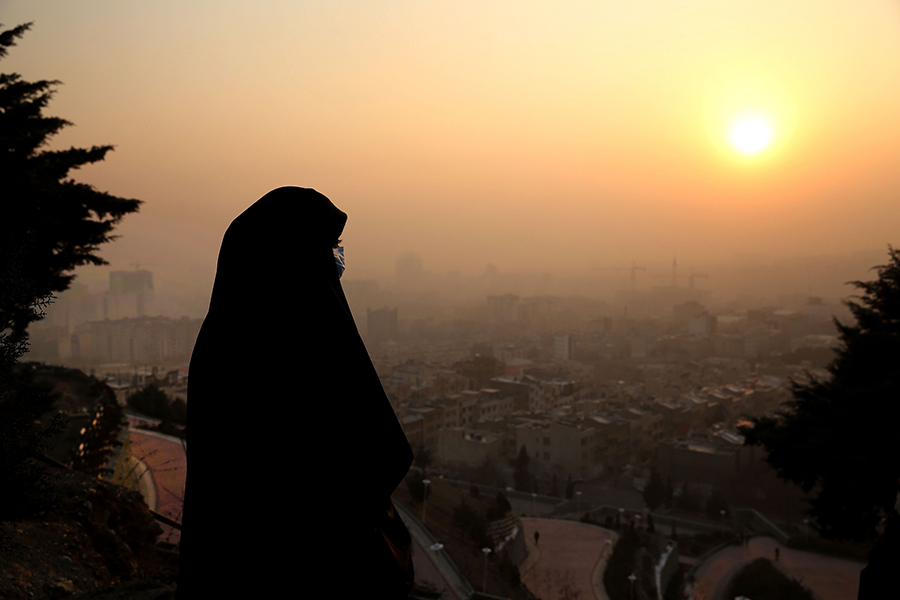 There are other nontraditional, potentially less sensitive areas where cooperation could become necessary and possible, starting with climate change, the environment, and water resources. Local ecosystems often do not neatly conform to state borders, straddling many sides. Climate change is already making the region less livable due to rising temperatures, power shortages, drought, desertification, and sandstorms.27 By establishing better formal and informal lines of communication and working relationships, regional states could ameliorate some of the worst effects of climate change. For instance, preserving and sharing finite freshwater resources could meet people's basic needs and prevent conflicts over water. Meanwhile, the region’s increased interest in nuclear energy means its leaders must find cooperative ways to establish and uphold strong safety and security standards to prevent nuclear incidents, accidental or otherwise.
There are other nontraditional, potentially less sensitive areas where cooperation could become necessary and possible, starting with climate change, the environment, and water resources. Local ecosystems often do not neatly conform to state borders, straddling many sides. Climate change is already making the region less livable due to rising temperatures, power shortages, drought, desertification, and sandstorms.27 By establishing better formal and informal lines of communication and working relationships, regional states could ameliorate some of the worst effects of climate change. For instance, preserving and sharing finite freshwater resources could meet people's basic needs and prevent conflicts over water. Meanwhile, the region’s increased interest in nuclear energy means its leaders must find cooperative ways to establish and uphold strong safety and security standards to prevent nuclear incidents, accidental or otherwise.
The same goes for the COVID-19 response. As with other parts of the world, no state in the Middle East is truly safe from pandemics unless its neighbors are. At a regional level, that means developing protocols to facilitate the movement of essential goods and people, even amid an outbreak, while stopping the spread of disease, including through exchanging information and vaccine sharing.
Although global powers have frequently been negative forces in the Middle East through military interventions, economic sanctions, and political pressures,28 they would be wise to support regional states in addressing these nontraditional security challenges. Failure to make inroads in promoting regional economic growth, arresting environmental degradation, and minimizing the ravages of pandemics will certainly hurt the people of the Middle East and destabilize their governments. Global powers will also be affected by these developments in the form of pressure to intervene in the region militarily, economically, and diplomatically and to help cope with the large waves of migration already hitting their shores and influencing their domestic politics.29
Looking Ahead
Whether the result of U.S.-Iranian negotiations is a JCPOA-plus, JCPOA-minus, or no JCPOA, regional cooperation on traditional and nontraditional security issues is still possible. The Abraham Accords between Israel and four Arab states signed during the Trump administration and recent cooperation in the eastern Mediterranean on natural gas are just two examples of what the regional states can do even amid seemingly intractable conflicts. The Abraham Accords may exist at least partly because of the specter of the JCPOA’s demise and the prospect of a nuclear-armed Iran.
Even so, conducting negotiations and reaching agreements will be more difficult with a weakened or nonexistent JCPOA. Since Trump blew up the Iran deal, the renewed nuclear challenge has fueled conflict and mistrust among regional states, needlessly drained governance capacity and diplomatic bandwidth, and made progress in other areas more elusive. A restored JCPOA or a JCPOA-plus, especially in the context of a receding U.S. footprint in the region, could flip these unfavorable conditions and become a cornerstone on which countries in the region can build a new security architecture and determine their own fates.
ENDNOTES
1. Javier Jordan, “International Competition Below the Threshold of War: Toward a Theory of Gray Zone Conflict,” Journal of Strategic Security, Vol. 14, No. 1 (2020): 1–24; Farzan Sabet, “A Fraught Road Ahead for the JCPOA?” UN Institute for Disarmament Research (UNIDIR), August 20, 2020, https://unidir.org/commentary/fraught-road-ahead-jcpoa.
2. Radio Farda, “Iran Ready to Resume Talks on Nuclear Deal, but Not Under Western 'Pressure,' Raisi Says,” Radio Free Europe/Radio Liberty (RFE/RL), September 4, 2021, https://www.rferl.org/a/iran-nuclear-raisi-jcpoa-negotiations-us/31443879.html.
3. Farzan Sabet, “The April 1977 Persepolis Conference on the Transfer of Nuclear Technology: A Third World Revolt Against U.S. Non-Proliferation Policy?” The International History Review, Vol. 40, No. 5 (2018).
4. “Iran,” Nuclear Threat Initiative, June 2020, https://www.nti.org/learn/countries/iran/nuclear/.
5. “Joint Comprehensive Plan of Action,” July 14, 2015, https://www.europarl.europa.eu/cmsdata/122460/full-text-of-the-iran-nuclear-deal.pdf.
6. John Krzyzaniak, “Iran and U.S. Still Far Apart on Reviving the JCPOA,” International Institute for Strategic Studies, August 23, 2021, https://www.iiss.org/blogs/analysis/2021/08/iran-us-jcpoa.
7. Laurence Norman, “Iran Pledges to Cooperate With UN Atomic Agency, Easing Nuclear Talks Threat,” The Wall Street Journal, September 12, 2021.
8. Maziar Motamedi, “U.S. Sanctions Inflicted $1 Trillion Damage on Iran’s Economy: FM,” Al Jazeera, February 21, 2021, https://www.aljazeera.com/news/2021/2/21/us-sanctions-inflicted-1-trillion-damage-on-irans-economy-fm.
9. Steven Erlanger and David E. Sanger, “U.S. and Iran Want to Restore the Nuclear Deal. They Disagree Deeply on What That Means,” The New York Times, May 9, 2021.
10. Saeid Jafari, “Saeed Jalili: The Former Nuclear Negotiator That Rubs Diplomats the Wrong Way,” Atlantic Council, June 11, 2021, https://www.atlanticcouncil.org/blogs/iransource/saeed-jalili-the-former-nuclear-negotiator-that-rubs-diplomats-the-wrong-way/.
11. Jackie Calmes, “What Will the Disastrous Fall of Kabul Mean for Voters in 2022?” Los Angeles Times, August 18, 2021.
12. Anshel Pfeffer, “They Once Called It the New ‘Munich.’ But Can Israel Now Live With a Nuclear Deal With Iran?” The Jewish Chronicle, September 23, 2021; Neri Zilber, “Israel Can Live With a New Iran Nuclear Deal, Defense Minister Says,” Foreign Policy, September 14, 2021, https://foreignpolicy.com/2021/09/14/israel-iran-nuclear-deal-defense-minister-gantz/; Judah Ari Gross, “As Bennett Meets Biden, IDF Ramps Up Plans for Strike on Iran’s Nuke Program,” The Times of Israel, August 25, 2021, https://www.timesofisrael.com/as-bennett-meets-biden-idf-ramps-up-plans-for-strike-on-irans-nuke-program/.
13. Gordon Lubold, Nancy A. Youssef, and Michael R. Gordon, “U.S. Military to Withdraw Hundreds of Troops, Aircraft, Antimissile Batteries From Middle East,” The Wall Street Journal, June 18, 2021.
14. “Rouhani Says Hopes Iran's Next Govt Can Conclude Nuclear Talks,” AFP, July 14, 2021, https://www.france24.com/en/live-news/20210714-rouhani-says-hopes-iran-s-next-govt-can-conclude-nuclear-talks.
15. Grégoire Mallard, Farzan Sabet, and Jin Sun, “The Humanitarian Gap in the Global Sanctions Regime: Assessing Causes, Effects, and Solutions,” Global Governance, Vol. 26, No. 1 (2020): 121–153.
16. Michael Stephens, “Israel and Normalisation: Is a New Middle East Order Emerging?” Center for Historical Analysis and Conflict Research, October 30, 2020, https://chacr.org.uk/2020/10/30/israel-and-normalisation-is-a-new-middle-east-order-emerging/.
17. “Iran Plans New Round of Talks With Saudi Arabia - Iranian Envoy,” Reuters, August 31, 2021, https://www.reuters.com/world/middle-east/iran-plans-new-round-talks-with-saudi-arabia-iranian-envoy-2021-08-31/.
18. Amberin Zaman, “Iraqi Kurdish Leader Helps Ease Turkey-UAE Tensions,” Al-Monitor, August 31, 2021, https://www.al-monitor.com/originals/2021/08/iraqi-kurdish-leader-helps-ease-turkey-uae-tensions.
19. Kristian Coates Ulrichsen, “Analysis: Has the Gulf Reconciled After the Qatar blockade?” Al Jazeera, June 3, 2021, https://www.aljazeera.com/features/2021/6/5/has-the-gulf-reconciled-after-the-end-of-the-qatar-blockade.
20. Ali Mamouri, “Baghdad Conference to Establish Cooperation, Partnership in Region,” Al-Monitor, August 30, 2021, https://www.al-monitor.com/originals/2021/08/baghdad-conference-establish-cooperation-partnership-region.
21. Dania Saadi, “Middle East Nuclear Ambitions Stymied by Financial Constraints, Enrichment Fears,” S&P Global Platts, November 11, 2020, https://www.spglobal.com/platts/en/market-insights/latest-news/electric-power/111120-middle-east-nuclear-ambitions-stymied-by-financial-constraints-enrichment-fears.
22. UN Security Council, “Concerned About Lasting Conflicts, Terrorism, Sectarian Tensions Plaguing Persian Gulf, Speakers in Security Council Stress Need for Coherent Approach to Collective Security,” SC/14333, October 20, 2020, https://www.un.org/press/en/2020/sc14333.doc.htm.
23. Chen Zak and Farzan Sabet, eds., “From the Iran Nuclear Deal to a Middle East Zone? Lessons From the JCPOA for an ME WMDFZ,” UNIDIR, 2021, https://unidir.org/sites/default/files/2021-06/UNIDIR%20-%20Lessons%20from%20the%20JCPOA%20for%20the%20ME%20WMDFZ%20essay%20series.pdf.
24. Golnaz Esfandiari, “What Iranian Foreign Policy Could Look Like Under President Raisi,” RFE/RL, June 17, 2021, https://www.rferl.org/a/iran-presidential-election-raisi-foreign-policy/31313258.html.
25. “International Arms Transfers Level Off After Years of Sharp Growth; Middle Eastern Arms Imports Grow Most, Says SIPRI,” Stockholm International Peace Research Institute, March 15, 2021, https://www.sipri.org/media/press-release/2021/international-arms-transfers-level-after-years-sharp-growth-middle-eastern-arms-imports-grow-most.
26. Anjli Raval, Chloe Cornish, and Neil Munshi, “Oil Producers Face Costly Transition as World Looks to Net-Zero Future,” Financial Times, May 26, 2021.
27. Anchal Vohra, “The Middle East Is Becoming Literally Uninhabitable,” Foreign Policy, August 24, 2021, https://foreignpolicy.com/2021/08/24/the-middle-east-is-becoming-literally-uninhabitable/.
28. Ahmed Rasheed and Louise Heavens, “Iraq at Risk of Power Shortages After Iran Reduced Gas Supply,” Reuters, September 1, 2021, https://www.reuters.com/article/iraq-gas-iran/iraq-at-risk-of-power-shortages-after-iran-reduced-gas-supply-idUSL1N2Q30K8.
29. Bassem Mroue, “Aid Groups: Millions in Syria, Iraq Losing Access to Water,” Associated Press, August 23, 2021, https://apnews.com/article/middle-east-business-syria-environment-and-nature-lebanon-e21f41e6a2b8d277b2547ce1e4b5b130.
Farzan Sabet is a researcher in the Middle East Weapons of Mass Destruction Free Zone Project at the UN Institute for Disarmament Research. He holds a Ph.D in international history from the Graduate Institute of International and Development Studies in Geneva.
